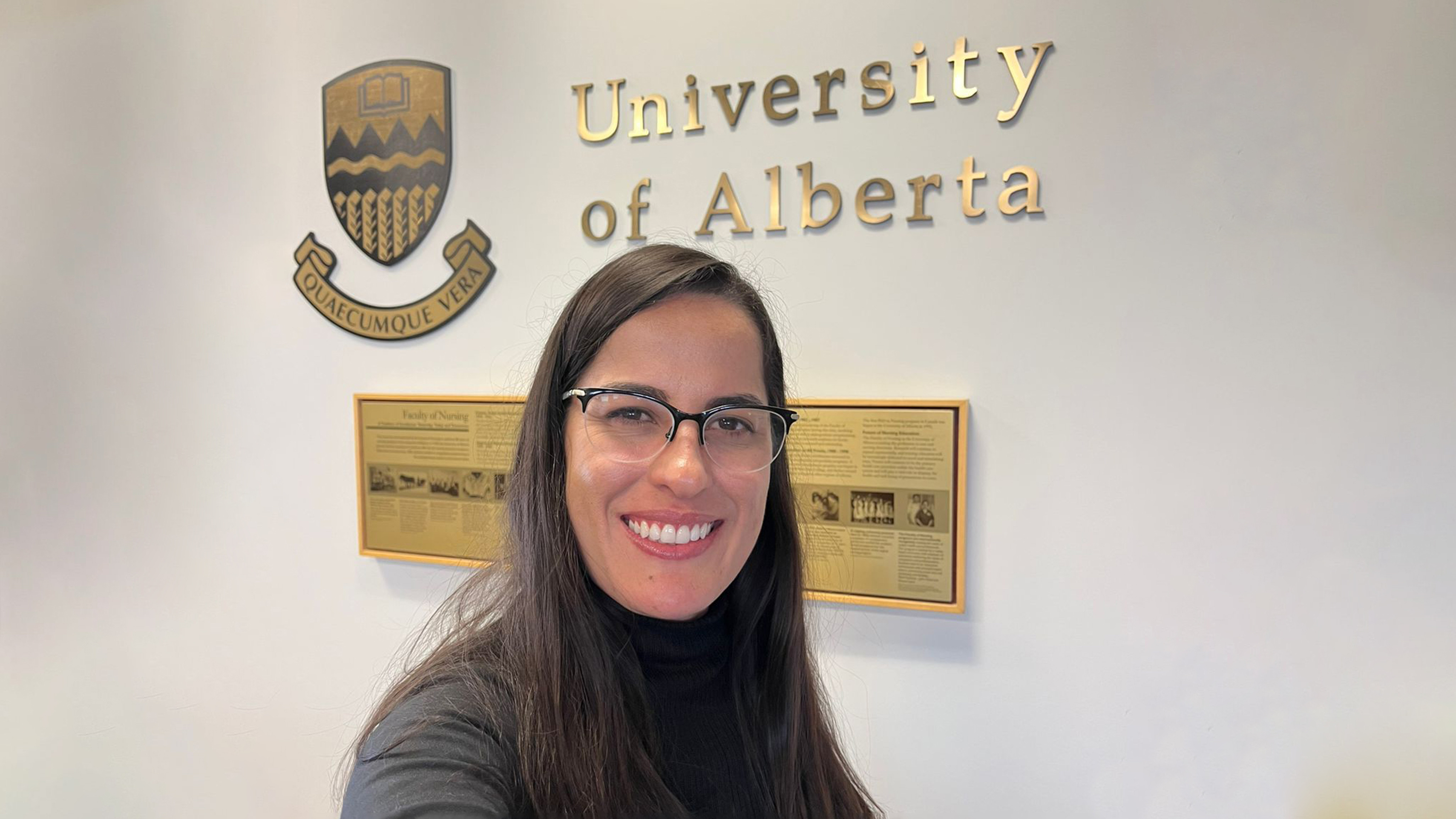Visiting scholar from Brazil attends Faculty of Nursing to pursue her research
5 February 2024

Rhyquelle Rhibna Neris
Rhyquelle Rhibna Neris is a PhD candidate at the Ribeirão Preto College of Nursing at the University of São Paulo in Brazil. Her research focuses on the quality of life experienced by adolescent and young adult survivors of childhood cancer.
Last fall Neris participated in the donor-sponsored Visiting Scholar Program through the University of Alberta Faculty of Nursing’s Global Nursing Office. The program builds capacity for international research collaborations, fosters two-way knowledge sharing, helps address global health inequities and provides grants to visiting scholars from low- and middle-income countries who wish to improve patient outcomes in their home countries.
While at the U of A, Neris worked under the supervision of Elisavet Papathanasoglou, whose research interests combine basic science with the nursing management of acutely ill patients.
We contacted Neris to learn more about her research and how her time at the U of A will benefit patients in her home community in Brazil.
Tell us about your research and how it addresses health challenges in Brazil.
I am interested in examining the quality of life among adolescents and young adults (AYAs) after cancer treatment.
Survivors bear a significant burden of late effects resulting from treatment, yet the Brazilian scientific community focuses on developing research that promotes care strategies for patients undergoing acute treatment for childhood cancer. Research on survivors years after completing treatment is scarce. My research fills this gap and gives AYA survivors a voice by describing their post-treatment quality of life.
Understanding the quality of life among AYAs can inform the customization and creation of suitable tools to identify survivors whose quality of life has been affected by cancer treatment, guiding interventions to enhance the survivorship experience and minimizing the impact late effects of cancer have on the lives of survivors.
Additionally, qualitative data resulting from my research will inform health-care professionals who contribute to formulating health policies related to survival, allocating strategic resources and developing plans and interventions specifically tailored for AYA childhood cancer survivors.
Why did you choose to pursue your research here?
The U of A is one of Canada's top research universities and holds international prestige in nursing research. The University of São Paulo Ribeirão Preto School of Nursing and the U of A Faculty of Nursing have maintained a formal relationship since 2005, with mutual benefits through a cooperative program that promotes academic activities and international understanding.
How has funding helped your research?
As an international research student at the Faculty of Nursing, I received two grants. Initially, CAPES/Brazil financed my stay from March until August 2023. Subsequently, I was awarded the Visiting Scholar Grant, which supported an extension of my research from September to November 2023.
How have your research supervisor and other collaborators helped?
Throughout my research internship, Dr. Papathanasoglou helped support me in the analysis of my research data, the preparation of my research reports in English and their submission to nursing research journals.
The collaboration of my Brazilian supervisor and two Spanish researchers associated with the Public University of Navarra — recognized authorities in the field of cancer survival — also benefited my research.
Has your research been published?
The results of my research are divided into two parts: One article has been finalized and submitted to the Revista Latino-Americana de Enfermagem (Impact Factor 1.9), and a second article is currently being finalized for submission to the Journal of Advanced Nursing (Impact Factor 3.8).
What did you learn during your time at the U of A?
I enhanced my knowledge related to qualitative data analysis. My supervisor shared valuable lessons that will benefit me in future research. I also participated in scientific events, interacted with students from different countries, and refined my speaking, understanding and writing skills in the English language.
Most importantly, I had the opportunity to develop my data analysis with my supervisor in English, gaining an international perspective on the analysis. Undergoing this process with the support of a researcher with extensive experience was the most remarkable learning experience.
My growth as a researcher and the knowledge I acquired will aid me in conducting additional research related to childhood cancer survival — research with the potential to enhance the well-being and quality of life of the community targeted by my studies.
What was your impression of the U of A?
It was my first visit to Canada. My overall impression was that the university boasts rich multiculturalism and robust internationalization, which I found to be a very positive aspect. I observed how the university supports and spearheads research on a wide range of topics, many of which are still relatively underexplored in Brazil.
What advice would you give to someone interested in the Visiting Scholar program?
It is an excellent opportunity to develop your research in collaboration with a university that is a world leader. Furthermore, the scholarship is a good value, providing the opportunity to experience life in Canada while engaging in research activities.
What’s next?
Completing my doctorate and finalizing the publication of my research results. Afterward, I will seek a postdoctoral opportunity to continue developing research in the area of childhood cancer survival.